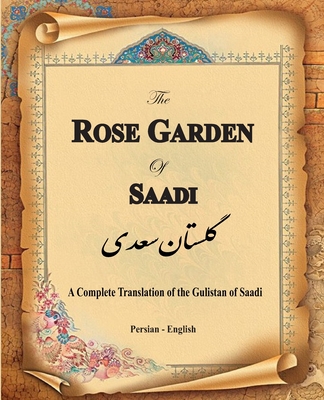The Rose Garden of Saadi: A Complete Translation of the Gulistan of Saadi (Bilingual)

The Rose Garden of Saadi: A Complete Translation of the Gulistan of Saadi (Bilingual)
بنی آدم اعضای یکدیگرند که در آفرینش ز یک گوهرند
The sons of Adam are limbs of each other
Having been created of one essence.
چو عضوی به درد آورد روزگار دگر عضوها را نماند قرار
When the calamity of time afflicts one limb
The other limbs cannot remain at rest.
تو کز محنت دیگران بی غمی نشاید که نامت نهند آدمی
If thou hast no sympathy for the troubles of others
Thou art unworthy to be called by the name of a man. Abu-Muhammad Musleh al-Din bin Abdallah Shirazi(1210-1291), known by his penname Sádi, was a major Persian poet and prose writer of the medieval period. He is broadly known as one of the greatest poets of the classical literary tradition, earning him the nickname "The Master of Speech" or "The Wordsmith" or simply "Master" among Persian scholars.
Sádi is known as a mystic and metaphysician in the history of Persian literature. Sádi elaborately distinguishes between the spiritual and the mundane aspects of life in his works. He tries to visualize the deepest meanings of life in the most palpable contexts and close to conversational language as far as possible in such a way that even common people can understand the most out of his writings. The best known and most reads of his writings are the Gulistan in prose and verse, and the Bustan in verse. He pleased in wit and power of repartee, and puns abound in his works. His moral and spiritual admonitions show great depth of thought, correct observation, and knowledge of human nature. Sádi's prose style of writing is simple but vigorous and described as "simple but impossible to imitate" flows quite naturally and effortlessly. Its simplicity, however, is based on a semantic web consisting of synonymity, homophony, and oxymoron buttressed by internal rhythm and external rhyme. Gulistan consisting of 8 chapters is primarily in prose. The book widely addresses kings' morality, dervishes' behavior, benefits of contentment, the advantage of silence, love and youthfulness, weakness in old age, the effect of education, and the rules for conduct life.
Golestan can be considered Saadi's report of the society of his time, in which the cultural and social conditions of the people are depicted in real life. In some stories, there are imaginary or real third-party characters, and they play a role, but in some stories, the author is present and observes some of these events, the real events of his life and some are merely fictional events.
PRP: 193.29 Lei
Acesta este Pretul Recomandat de Producator. Pretul de vanzare al produsului este afisat mai jos.
173.96Lei
173.96Lei
193.29 LeiLivrare in 2-4 saptamani
Descrierea produsului
بنی آدم اعضای یکدیگرند که در آفرینش ز یک گوهرند
The sons of Adam are limbs of each other
Having been created of one essence.
چو عضوی به درد آورد روزگار دگر عضوها را نماند قرار
When the calamity of time afflicts one limb
The other limbs cannot remain at rest.
تو کز محنت دیگران بی غمی نشاید که نامت نهند آدمی
If thou hast no sympathy for the troubles of others
Thou art unworthy to be called by the name of a man. Abu-Muhammad Musleh al-Din bin Abdallah Shirazi(1210-1291), known by his penname Sádi, was a major Persian poet and prose writer of the medieval period. He is broadly known as one of the greatest poets of the classical literary tradition, earning him the nickname "The Master of Speech" or "The Wordsmith" or simply "Master" among Persian scholars.
Sádi is known as a mystic and metaphysician in the history of Persian literature. Sádi elaborately distinguishes between the spiritual and the mundane aspects of life in his works. He tries to visualize the deepest meanings of life in the most palpable contexts and close to conversational language as far as possible in such a way that even common people can understand the most out of his writings. The best known and most reads of his writings are the Gulistan in prose and verse, and the Bustan in verse. He pleased in wit and power of repartee, and puns abound in his works. His moral and spiritual admonitions show great depth of thought, correct observation, and knowledge of human nature. Sádi's prose style of writing is simple but vigorous and described as "simple but impossible to imitate" flows quite naturally and effortlessly. Its simplicity, however, is based on a semantic web consisting of synonymity, homophony, and oxymoron buttressed by internal rhythm and external rhyme. Gulistan consisting of 8 chapters is primarily in prose. The book widely addresses kings' morality, dervishes' behavior, benefits of contentment, the advantage of silence, love and youthfulness, weakness in old age, the effect of education, and the rules for conduct life.
Golestan can be considered Saadi's report of the society of his time, in which the cultural and social conditions of the people are depicted in real life. In some stories, there are imaginary or real third-party characters, and they play a role, but in some stories, the author is present and observes some of these events, the real events of his life and some are merely fictional events.
Detaliile produsului









